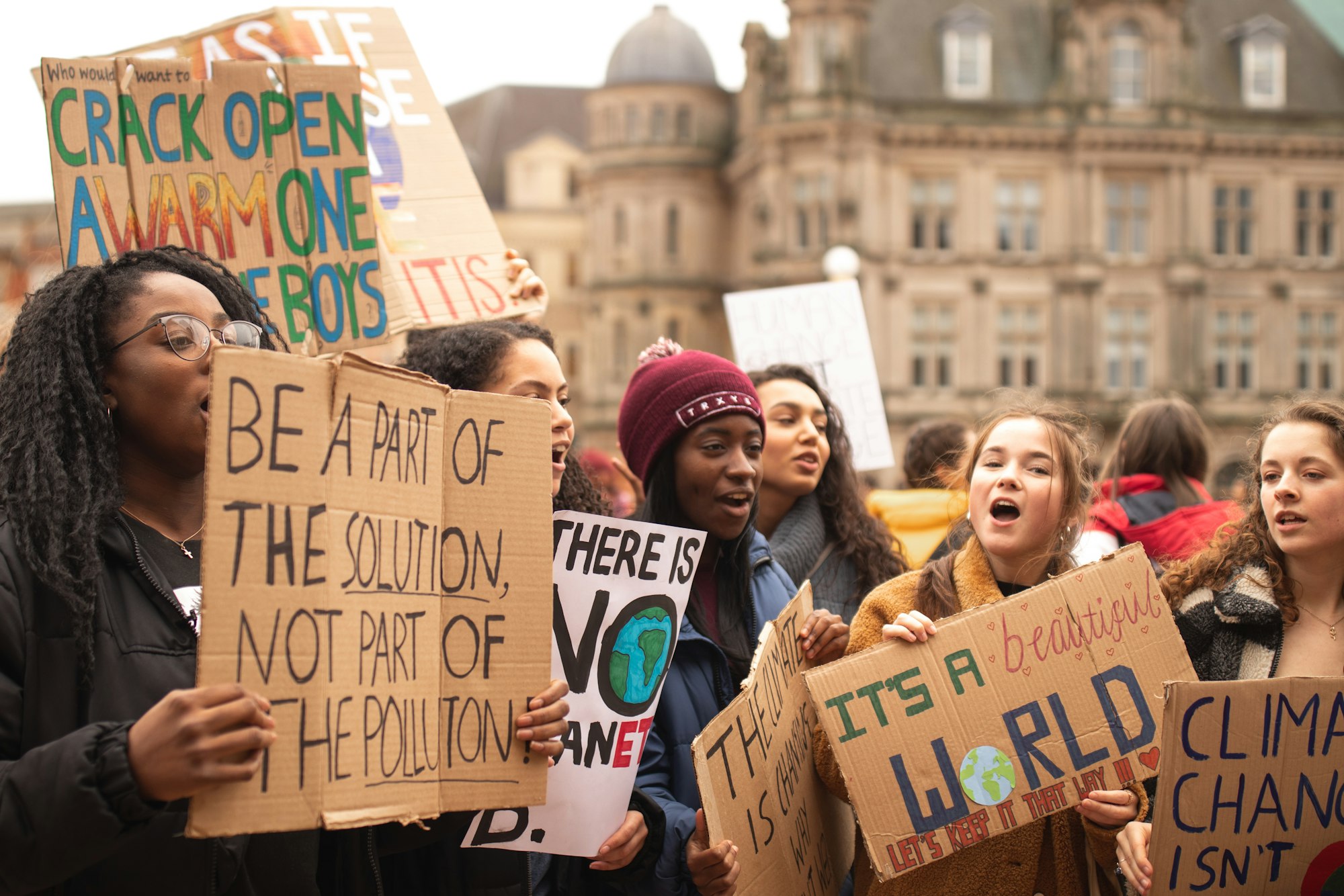By Logan Manning
As I stood in Tappan Square on September 20th, I couldn’t help but notice the obvious irony and symbolism in the overwhelming light and heat mercilessly beamed down by the morning sun upon the faces of those attending that morning’s climate strike. Collectively, we were accosted by an unrelenting reminder that our efforts to address the ongoing collapse of our planet’s ecosystems and climate exist in the face of forces of almost incomprehensible magnitude and power.
For many, I imagine the experience of attending the climate strike was an uplifting one. Our community demonstrated real solidarity with the most vulnerable among us who have, and will continue to, experience the most brutal effects of the climate crisis.
However, I think that the immense power of that September morning sun was emblematic of an important political reality. Underneath the honest intentions of the climate strike lies a specific type of environmental politics which refuses to confront the true nature and scope of the power of global capitalism.
Grassroots political organization, at its most fundamental, is the attempt to confront, seize, and ultimately maintain power. The Oberlin climate strike offered ample personal accounts of the pain which climate change will continue to inflict upon an ever-growing number of human lives. However, its strategies and rhetoric declined to account for the capitalist political and economic structures under which the climate crisis has emerged. The result: a political movement unequipped to meaningfully confront and defeat the systems of power responsible for leading the planet to the brink of ecological collapse.
It is crucial that we do not conceive of the climate crisis as a simple “problem,” a mere inconvenience, arising within the context of a functional economic and political system. Fundamental to the basic existence of capitalism is profit, for which growth is a necessary precondition. The commodification of nature itself under capitalism, alongside capital’s basic requirement of endless growth, ensures that environmental destruction is a permanent fixture of capitalism. It is of dire importance that this context informs our political struggle for environmental justice.
The responses to the climate crisis deemed politically feasible by the mainstream in America are uniformly resigned to the realm of electoral politics. Proposed action rarely extends beyond voting, pressuring elected officials, and attending rallies. While electoralism is a necessary aspect of political organization in the US, limiting ourselves to only these forms of political action is a mistake.
The American state is designed to act upon the whim of business and its interests. Checks and balances, judicial review, the electoral college, voter suppression, widespread inequality, decentralization of power, etc. all work to eradicate the possibility for a coherent and centralized state policy shaped by truly democratic means. Democratic representatives, faced with the immense costs associated with running a successful campaign, are presented with a largely unfettered system of influence from business (ranging from entirely legal lobbying to bare-faced bribery). Dependent upon this system of financial contributions for electoral success, representatives sacrifice the pursuit of ambitious legislation in exchange for constant reconciliation with the interests of capital.
In 2018, the oil and gas lobby spent more than 125 million dollars on legal contributions and donations to political campaigns and representatives. Oil and gas lobbying totals have surpassed 100 million dollars a year for 10 consecutive years. This wealth has and will continue to be spent with the expressed goal of preventing our liberal democratic institutions from allowing radical change to occur in response to the climate crisis. The environmental reality in 2019 demonstrates that this wealth is effectively achieving its goals.
We must extend our political imagination beyond the realm of liberal democracy, towards actions which directly confront capital and business as the largest and most powerful organized interest in this country and the world. Our calls for democratic engagement must be accompanied by a call for the organization of the only interest group which wields power comparable to that of capital: the working class.
The #NoDAPL movement, an Indigenous-led direct action which resisted the construction of the 1,172-mile-long Dakota Access Pipeline in 2016, provides us with an empirical example of what this type of political activism can look like. It is an exemplary model of a coalition of working people, directly resisting the destruction of the environment in the name of profit. We would do well in adopting this model as foundational to our political response to the climate crisis.
#NoDAPL, and actions like it, show that if we wish to truly resist the forces actively destroying our planet, mere electoral action is not enough. We must build broad coalitions with the tactics and numbers that equip us to confront the powers which maintain the capitalist status quo through direct, material action and struggle.
By honestly analyzing power under capitalism, we give ourselves the capacity to respond to the collapse of our climate with direct and effective resistance to the powers that be. And in that, I think we will find a bountiful source of hope for a future much more just and equitable than the one of crisis and horror which we are heading towards, while also finding the power to make that brighter future a reality for all.

